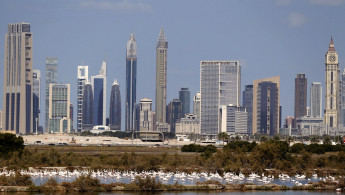Water-saving greenhouse unveiled in UAE
A greenhouse being built in the UAE will allow farmers to use 90 percent less water, and was unveiled by Dubai's International Centre for Biosaline Agriculture on Monday.
2 min read
Urban expansion and climate change have deepened water scarcity in the region [AFP]
A greenhouse being built in the UAE that will allow farmers to use 90 percent less water was unveiled by Dubai's International Centre for Biosaline Agriculture on Monday, reported UAE-newspaper the National.
The system will use water evaporated from plants to cool the crops, which will help save water in a country, where 56 percent of the resources used goes on agriculture.
The greenhouse has been designed by a team of local and international scientists and is being built on a farm in Al Dhaid.
"Ninety per cent of the water we give plants is absorbed by the roots and released in the form of vapour," Redouane Choukr-Allah, head of the project at ICBA, told the National.
"It is a way of reducing the temperature of the plant, otherwise it will get burnt, in a similar way to when people sweat to cool down. We plan to recover that water and re-using it."
The project is a collaboration between the ICBA, the Food and Agriculture Organisation, the Ministry of Environment and Water, and the International Centre for Agricultural Research in Dry Areas (Icarda).
The greenhouse is due to be completed next month and begin operating in November.
Scientists say the system will produce five times more food than could be grown in an open area the same size.
The system uses a desiccant, such as magnesium chloride, to reduce humidity during the day, which allows the plants to release more water.
"At night, we heat up the desiccant to bring that water back to the greenhouse through evaporation," Choukr-Allah said.
"The water will then condense on the plastic of the greenhouse and go back down to the roots of the plants."
The system is "essential for GCC countries and many dry areas", said Ahmed Moustafa, Icarda's regional coordinator for the Arabian Peninsula.
The region is one of the most severely affected by water scarcity due to urban expansion and climate change, said Pasquale Steduto, the UN's Food and Agriculture Organisation's deputy regional representative for the Near East and North Africa.
"All put pressure and demand on water, which is becoming scarce as demand increases. Countries need to strategically plan how their water resources are allocated. Protected agriculture is one way of doing that," she said.
The system will use water evaporated from plants to cool the crops, which will help save water in a country, where 56 percent of the resources used goes on agriculture.
The greenhouse has been designed by a team of local and international scientists and is being built on a farm in Al Dhaid.
"Ninety per cent of the water we give plants is absorbed by the roots and released in the form of vapour," Redouane Choukr-Allah, head of the project at ICBA, told the National.
| Scientists say the system will produce five times more food than could be grown in open fields |
"It is a way of reducing the temperature of the plant, otherwise it will get burnt, in a similar way to when people sweat to cool down. We plan to recover that water and re-using it."
The project is a collaboration between the ICBA, the Food and Agriculture Organisation, the Ministry of Environment and Water, and the International Centre for Agricultural Research in Dry Areas (Icarda).
The greenhouse is due to be completed next month and begin operating in November.
Scientists say the system will produce five times more food than could be grown in an open area the same size.
The system uses a desiccant, such as magnesium chloride, to reduce humidity during the day, which allows the plants to release more water.
"At night, we heat up the desiccant to bring that water back to the greenhouse through evaporation," Choukr-Allah said.
"The water will then condense on the plastic of the greenhouse and go back down to the roots of the plants."
The system is "essential for GCC countries and many dry areas", said Ahmed Moustafa, Icarda's regional coordinator for the Arabian Peninsula.
The region is one of the most severely affected by water scarcity due to urban expansion and climate change, said Pasquale Steduto, the UN's Food and Agriculture Organisation's deputy regional representative for the Near East and North Africa.
"All put pressure and demand on water, which is becoming scarce as demand increases. Countries need to strategically plan how their water resources are allocated. Protected agriculture is one way of doing that," she said.





 Follow the Middle East's top stories in English at The New Arab on Google News
Follow the Middle East's top stories in English at The New Arab on Google News
![Netanyahu furiously denounced the ICC [Getty]](/sites/default/files/styles/image_330x185/public/2024-11/GettyImages-2169352575.jpg?h=199d8c1f&itok=-vRiruf5)
![Both Hamas and the Palestinian Authority welcomed the ICC arrest warrants [Getty]](/sites/default/files/styles/image_330x185/public/2024-11/GettyImages-2178351173.jpg?h=199d8c1f&itok=TV858iVg)
